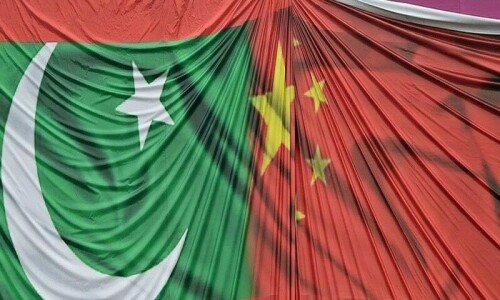KARACHI: Amid the din of the excavating machines and the rumble of dumpers removing and hauling tonnes of earth, the voice of indigenous communities in Sindh has been drowned out.
Nabi Bux, a resident of Sehnri Dars in the province’s Thar desert, can attest as much.
His village, roughly 400km from Karachi, has been acquired by the Sindh Engro Coal Mining Company (SECMC) and, as a result, he and about 1,800 fellow residents are to be relocated 25km away.
“Engro is making brand new homes for us, but the spiritual attachment we have to our ancestral land is lost to them,” he says. “Nor can you put a price tag to it.”
The Sindh government is backing the project, under which the villagers were coerced into selling their land in the “greater national interest”. Official estimates suggest there are 175bn tonnes of lignite coal reserves beneath the 9,000 sq km stretch of land — enough to last “400 years”, according to Federal Planning and Development Minister Ahsan Iqbal — and the villagers were promised that the sale would bring personal as well as national prosperity.
“Our elders had predicted the day would come when we’d be asked to move out,” says Dars.
Serious power shortages have crippled industry — in summer, Pakistan faces a shortfall of more than 6,000MW — and many see coal as the only resource that can save the country from total darkness.
Last month, during the signing of an agreement with China for a power generation project, the electricity went off twice, plunging the conference hall into darkness for a few minutes.
The agreement papers were reviewed using mobile phone torches.
Many are alarmed by Pakistan’s insistence on turning to coal, however. Among them is Dr Abid Suleri, executive director of the Islamabad-based Sustainable Development Policy Institute, who likens the approach to “investing in an old gramophone”.
Suleri believes coal cannot be exploited if the global temperature rise is to remain below two degrees Celsius. “Pakistan had signed and ratified climate declarations in Paris and Morocco — what of them?” he asks.
If Pakistan has to invest in coal, says Suleri, it must also invest in renewables. “We should not put ourselves in the absolute either/or situation, but adopt a more flexible one, dabbling in a good mix.”
Suleri feels that, were there a need for Pakistan to stop using coal overnight, the country should be able to cope without difficulty.
Yet for people living close to the dumping site in Sehnri Dars, it is living with coal rather than living without it that is the problem.
“The entire village … our homes, utensils, clothes, trees, you name it … everything is covered with a thick sheet of dust due to the digging and the dumping of soil,” says Bux.
“I shudder to think what will happen in June when strong gusts blow.”
The relocation will not start before 2018, says SECMC.
The villagers of Sehnri Dars may have acquiesced, but people in the 12 villages around Gorano have not; they feel cheated. They have been holding a sit-in outside the press club in Islamkot, an adjoining town, for more than 100 days in protest at the construction of a reservoir in Gorano which began in May last year.
The reservoir will store about 30 to 35 cusecs [a unit of flow equal to one cubic foot per second] of effluent from the coal mine over the next three years.
“When we found out that the water will carry 5,000 ppm [parts per million] for the total dissolved solids (TDS) we got really worried,” says Lakshman Dharmu.
“In less than three years, our sweet water wells will become poisonous, rendering our land unfit either for cultivation or grazing because this water will seep and affect the groundwater,” says Dharmu. There are 30 such wells.
A spokesman from the mining company says it would take 14 years for any damage to occur to land within a 1km radius. The company will not use the reservoir for more than three years.
The villagers also filed a complaint in the high court in June saying that the company acquired land invoking certain sections of the Land Acquisition Act of 1894, which allows the mining authority to acquire land but only after seeking permission from the landowner.
“But we never granted them permission,” says Leela Ram Manjiani, a local resident who is a lawyer and is representing the villagers. He said they were not even told.
While the protest continues, the coal company is busy buying land from villagers who are willing to sell. The rest, says Mohsin Babbar of the SECMC, is government land for which they already have permission.
“Of the total 532 acres, we have bought 250 acres of land from the locals; 700 acres is government land that we have permission to use. That just leaves 282 or so acres that remains disputed. We have offered them about 300 acres of pasture land not very far from where they are right now but they are not accepting this compensation,” says Babbar.
The villagers do not have papers to prove it’s their land. “And those who do still have it in the names of their forefathers. To get the land transferred to their name requires a lot of money which they don’t have,” says Manjiani.
“On the one side the locals are uneducated, belong to a religious minority and do not really have a voice and on the other side is a powerful entity,” says Suleri, who fears this will give the state an upper hand and the infractions of the mining company will be ignored by the state which is fully supporting the project and marginalise the indigenous people.
“We will not back off, we will go to the Supreme Court,” says Manjiani, adding: “We have full faith in the courts.”
By arrangement with The Guardian
Published in Dawn, February 28th, 2017













































